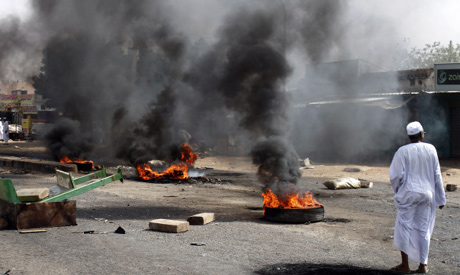
The headway from Khartoum to the north, in Kadro, some 24 km from Khartoum. (Photo AP).
The government of Omar Ali al-Bashir in Sudan is in trouble. At least 27 people have been killed in protests in Khartoum, after president Omar al-Bashir, who is in power since an islamist backed military coup in 1989, on Monday announced severe cuts in fuel subsidies, saying that the existing system posed a danger to the entire Sudanese economy.
A medical source at a hospital in Khartoum's Omdurman neighborhood, speaking on condition of anonymity, told Reuters: "There were 27 people killed in the protests and their bodies are at the Omdurman hospital."
On Thursday the unrest spread to Sudan's biggest port. Port Sudan. Police fired tear gas volleys to quell a small but strident protest in this city on the Red Sea coast where participants chanted,"Down, down with the regime", according to witnesses.
After the subsidie were cut, oil prices reached 20.8 Sudanese pounds ($4.71) a gallon from 12.5 ($2.83), while diesel became worth 13.9 pounds ($3.15) instead of 8.5 pounds ($1.93). On Tuesday, a day after the decision, furious protesters stormed the ruling National Congress Party headquarters in the city of Omdurman. "I saw the building's three floors on fire as people fled," a witness told AFP, saying many were carrying looted furniture.
On Wednesday thousands marched in Khartoum torching cars, buildings and petrol stations. There was no sign of new unrest in the capital on Thursday but tension reigned amid tight security. Security forces patrolled in pickup trucks mounted with machine guns. Many shops and petrol stations were closed.
Similar protests broke out in June last year after some fuel subsidies were cut, but they fizzled after a security crackdown in which hundreeds were arrested.This round of unrest started on Monday after the government announced another set of fuel subsidy cutbacks, causing pump prices to almost double overnight.
The cuts have been driven by a severe financial crunch since the secession of oil-producing South Sudan in 2011, which deprived Khartoum of three-quarters of the crude output it relied on for state revenues and foreign currency used to import food.
Moez Ali, a Sudanese political commentator and blogger, spoke to Ahram Online on the economic prospective of the ongoing crisis. "As it has done for so many years, the government has mismanaged state funds and that’s why it's facing a deficit." He stated that the last government budget was mostly allocated to defence and security purposes (80 percent), while education and health care received 2 percent and 3 percent, respectively. The military budget is used to fund the government's attempts to squash the rebellions in the Blue Nile State, South Kordofan State and Darfur, and is also used to feed the governments notorious National Intelligence and Security Service (NISS) that ensures its grip on power, Ali argued.
The government tried to censor the news of the protests as much as it could. Internet access was cut off across Sudan on Wednesday, causing a total blackout and only about five newspapers reached kiosks on Thursday, carrying mainly statements from First Vice President Ali Osman Taha denouncing the destruction of public and private property during the protests. Editors at three newspapers said they had either been prevented from publishing by security agents or had decided not to publish to protest at state attempts to steer coverage.
Journalists said security agents had ordered editors at a meeting on Wednesday to publish only the official version describing the protests as "sabotage" and criminals. Still, independent daily al-Ahram published pictures of burned cars and buildings.
The state-linked Sudanese Media Centre said schools in Khartoum state would be shut until September 30. Students have been at the forefront of previous rounds of anti-government protests.


.jpg)


No comments:
Post a Comment